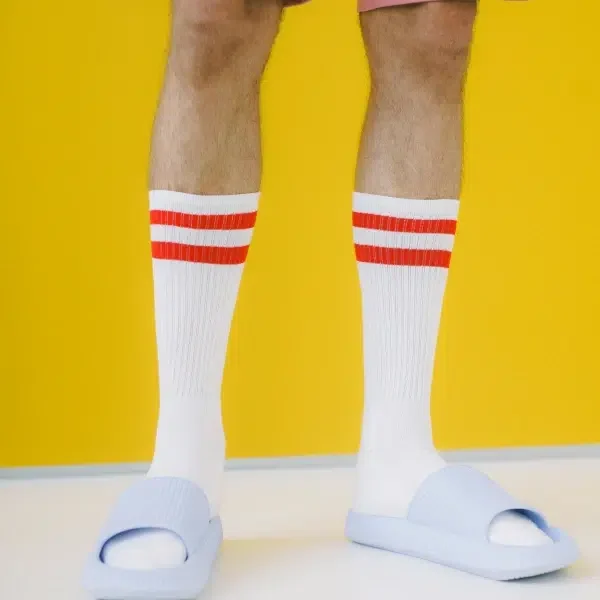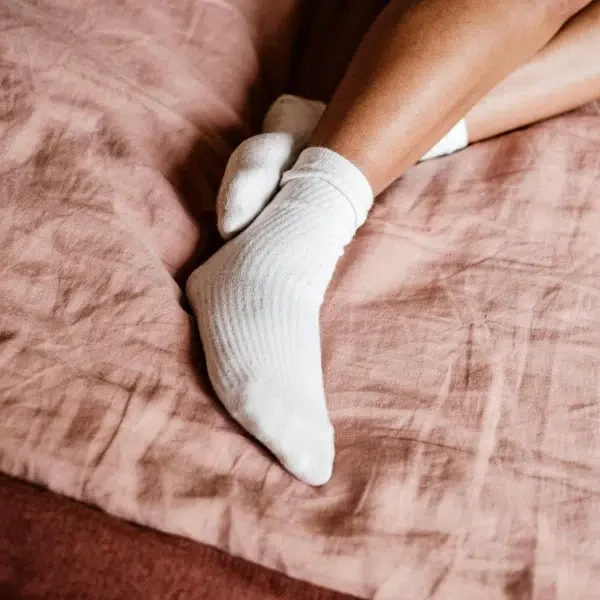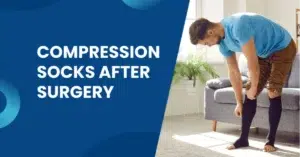If you’ve ever experienced the discomfort of swollen legs or dealt with the pain and unsightly appearance of varicose veins, you probably heard about the wonders that compression socks can bring to your life. Compression socks provide therapeutic benefits by applying pressure to the legs and feet, which promotes better blood circulation and alleviates discomfort. They have gained significant popularity among individuals suffering from various foot-related issues such as edema, painful swelling, and varicose veins.
With their numerous advantages, a question often arises and that is “Can I sleep in compression socks?” In this article, we will provide all the necessary insights regarding this topic and help you know whether it is safe and beneficial to sleep in compression socks.
How Do Compression Socks Work?
Compression socks work by exerting graduated pressure on the legs, with the highest pressure at the ankle and gradually decreasing as they move up the leg. This compression helps to improve blood flow, preventing blood from pooling in the lower extremities and reducing swelling. By enhancing circulation, they can provide relief from symptoms associated with various conditions, including diabetes and poor blood circulation.

Is It OK to Sleep in Compression Socks?
Are you wondering: Should I sleep in compression socks or not? The answer is a resounding yes! No inherent risks are associated with wearing compression socks for 24 hours a day, including during sleep. In fact, many individuals who experience certain medical conditions find it beneficial to keep their compression socks on as long as possible to maximize the therapeutic effects.
While sleeping with compression socks doesn’t pose any medical threats, it is essential to wear a fresh pair of compression socks daily, especially for individuals with diabetes who are more prone to foot infections. By maintaining good hygiene and ensuring that your compression socks are clean, you can continue to reap the benefits of wearing them while minimizing potential risks.
Who Should Wear Compression Socks?
Now that we’ve explored whether it is okay to sleep in compression socks. Let’s explore the various situations and individuals who can benefit from incorporating them into their daily routines.

Medical Conditions
Medical professionals often recommend compression socks for individuals dealing with various conditions. These include:
- Compression socks can help improve blood flow, especially for those with poor circulation due to conditions like diabetes or peripheral artery disease.
- Individuals experiencing edema or lymphedema can find relief through the gentle pressure exerted by compression socks.
- People prone to low blood pressure upon standing can benefit from compression socks, which aid in maintaining proper blood flow.
- Compression socks prevent blood from pooling in the leg veins, reducing the risk of developing deep vein thrombosis (DVT), a potentially serious condition.
- Compression socks can help alleviate pain and promote healing for individuals suffering from venous ulcers or seeking relief from the discomfort of varicose veins.
- By applying pressure to the lower legs, compression socks can help counteract the effects of venous hypertension, a condition characterized by high blood pressure in the veins.
Athletes
Athletes often turn to compression socks to optimize their performance and enhance recovery. Wearing compression socks on their arms or legs during workouts or competitions can help athletes maximize blood flow and oxygen supply to the muscles, leading to improved endurance and performance. Some sportspersons also utilize compression wraps to speed up muscle recovery and reduce post-exercise soreness.

Pregnant Women
Pregnancy can bring about discomfort and swelling in the legs, feet, and ankles. Compression socks during pregnancy can reduce swelling and any foot pain associated with it. Wearing compression socks in the morning helps minimize swelling throughout the day, and sleeping in compression socks can improve the quality of sleep by addressing the symptoms of certain painful or uncomfortable conditions.

Travelers
Long flights and extended periods of sitting increase the risk of deep vein thrombosis (DVT) or blood clots. Compression socks can benefit airplane passengers and crew during long or frequent air travel by improving blood circulation and lowering the risk of developing DVT or blood clots.

Working Professionals
Individuals who spend long hours on their feet for work can experience fatigue, pain, and severe swelling. Compression socks at night or throughout the day can provide much-needed relief by increasing blood and oxygen flow and enhancing circulation in the legs and feet. This can ultimately reduce fatigue, alleviate foot pain, and prevent swelling associated with prolonged standing.
The Benefits of Sleeping in Compression Socks
After discussing the general situations where wearing compression socks can be beneficial, it is now important to highlight the specific advantages of wearing them to bed. Although individuals who are generally healthy may not find significant benefits from sleeping in compression socks, there are certain cases where it is acceptable and even recommended.

Improves Blood Flow
One of the primary reasons to sleep in compression socks is to enhance blood circulation. The gentle pressure these socks exert while standing or sitting helps blood flow more smoothly and efficiently. While lying down or sleeping, gravity is no longer a factor, reducing the need for compression socks. However, individuals with blood pressure conditions such as orthostatic hypotension may still benefit from wearing compression stockings to bed. This disorder causes dizziness or fainting when transitioning from a lying or sitting position to standing. Compression socks increase blood flow, alleviating this symptom and promoting overall circulation.
Protects Sore Spots
People with venous conditions may develop ulcers or sore spots due to increased pressure within the blood vessels of their legs. Wearing compression socks to bed encourages better blood flow and protects these tender areas from chafing or accidental bumps during sleep. This combination of improved circulation and protection aids in the healing of existing sores and prevents the formation of new ones.
Reduces Swelling
Compression socks are particularly effective in reducing swelling, especially during long periods of sitting or travel. Prolonged sitting in a car, bus, or airplane can lead to fluid accumulation in the feet, ankles, and lower legs, resulting in uncomfortable swelling. By applying graduated pressure, compression socks help maintain proper fluid flow and significantly reduce inflammation. This makes them an excellent choice for wearing to bed, as they continue alleviating swelling throughout the night.
Enhances Muscle Recovery
For athletes or individuals engaged in physically demanding activities, sleeping with compression socks can aid in muscle recovery. The increased blood circulation facilitated by these socks helps deliver oxygen and nutrients to tired muscles, promoting faster healing and reducing post-exercise soreness. By wearing compression socks during sleep, you can maximize the benefits of muscle recovery and wake up feeling refreshed and ready for the day ahead.
Now, we hope you know why you should sleep in compression socks. In addition to the previously discussed benefits, there are some cases in which it’s become even more practical to sleep in compression socks. These include hospital staff napping between shifts, travelers sleeping upright on airplanes, recovery from leg or spinal surgery, and conditions that affect circulation.
Safety Tips & Precautions to Sleep in Compression Socks
Sleeping in compression socks can offer various benefits, such as improved blood flow and reduced swelling. However, it is crucial to prioritize safety and take necessary precautions to ensure a comfortable and risk-free experience. In this section, we will discuss important safety tips and precautions that you should keep in mind when you sleep in compression socks.

Consult with Your Healthcare Provider
Before sleeping in compression socks, it is essential to consult with your doctor or healthcare provider. They can evaluate your specific needs and conditions, which will ensure that wearing compression socks during sleep is safe and appropriate for you.
Choose Compression Socks Designed for Nighttime Use
When selecting compression socks for sleeping, opt for those specifically designed for nighttime use. These socks are typically less restrictive and more comfortable, allowing for a restful night’s sleep while still providing the necessary compression benefits.
Ensure Proper Fit
Proper fit is crucial to ensure the effectiveness and safety of compression socks. Avoid socks that are excessively tight, as they can restrict blood flow and cause discomfort. On the other hand, socks that are too loose may not provide the desired compression.
Maintain Cleanliness and Dryness
To prevent skin irritation and potential infections, it is important to keep your feet and legs clean and dry when wearing compression socks to bed. Regularly wash your feet with mild soap and water, and make sure they are completely dry before putting on the socks.
Regularly Wash and Air Dry Your Socks
Maintaining proper hygiene for your compression socks is also crucial. Wash your socks regularly, following the manufacturer’s instructions to keep them clean and free from bacteria. It is recommended to air dry the socks completely to preserve their elasticity and prevent damage from heat.
Listen to Your Body
Pay attention to any discomfort or pain while wearing compression socks during sleep. If you experience any adverse effects, such as numbness, tingling, or increased pain, remove the socks immediately and consult with your healthcare provider. They can assess the situation and suggest appropriate adjustments or alternative solutions to sleep with compression socks.

Conclusion
Compression socks help improve circulation and reduce swelling in the legs, and wearing them to bed can be a convenient way to get the benefits while you sleep. In this guide, we provide insights into whether you can sleep in compression socks and discuss how they work and align with individual health needs.
Even though compression socks offer numerous benefits, it is essential to prioritize your health and seek professional advice before incorporating them into your bedtime routine. Every individual has unique needs and medical considerations that should guide the healthcare professional in deciding whether to sleep in compression socks. In this way, you can ensure that you are making informed decisions regarding your well-being and optimizing the potential benefits of compression socks.

FAQs about Can You Sleep in Compression Socks
1. Should I wear compression socks to bed to treat sleep apnea?
Sleep apnea, a condition characterized by interrupted breathing during sleep, can be a serious disorder. While compression socks are not a direct treatment for sleep apnea, they can help improve blood circulation and reduce fluid buildup in the legs. In this regard, a recent study suggests that wearing compression socks during the day can decrease the severity of obstructive sleep apnea (OSA) by reducing fluid shift and promoting upper-airway dilation.
2. How long can I sleep with compression socks?
There is no specific time limit for wearing compression socks during sleep. You can wear them for short naps or throughout the entire night, as long as they are comfortable. Some individuals may choose to wear compression socks 24/7, but it is important to change your socks at least once per day to maintain hygiene and ensure their effectiveness.
3. When compression socks should not be worn?
While compression socks offer numerous benefits, there are certain situations where they should be avoided:
- Ischemia (advanced arterial disease)
- Untreated septic phlebitis
- Uncontrolled congestive heart failure
- Phlegmasia cerulea dolens



